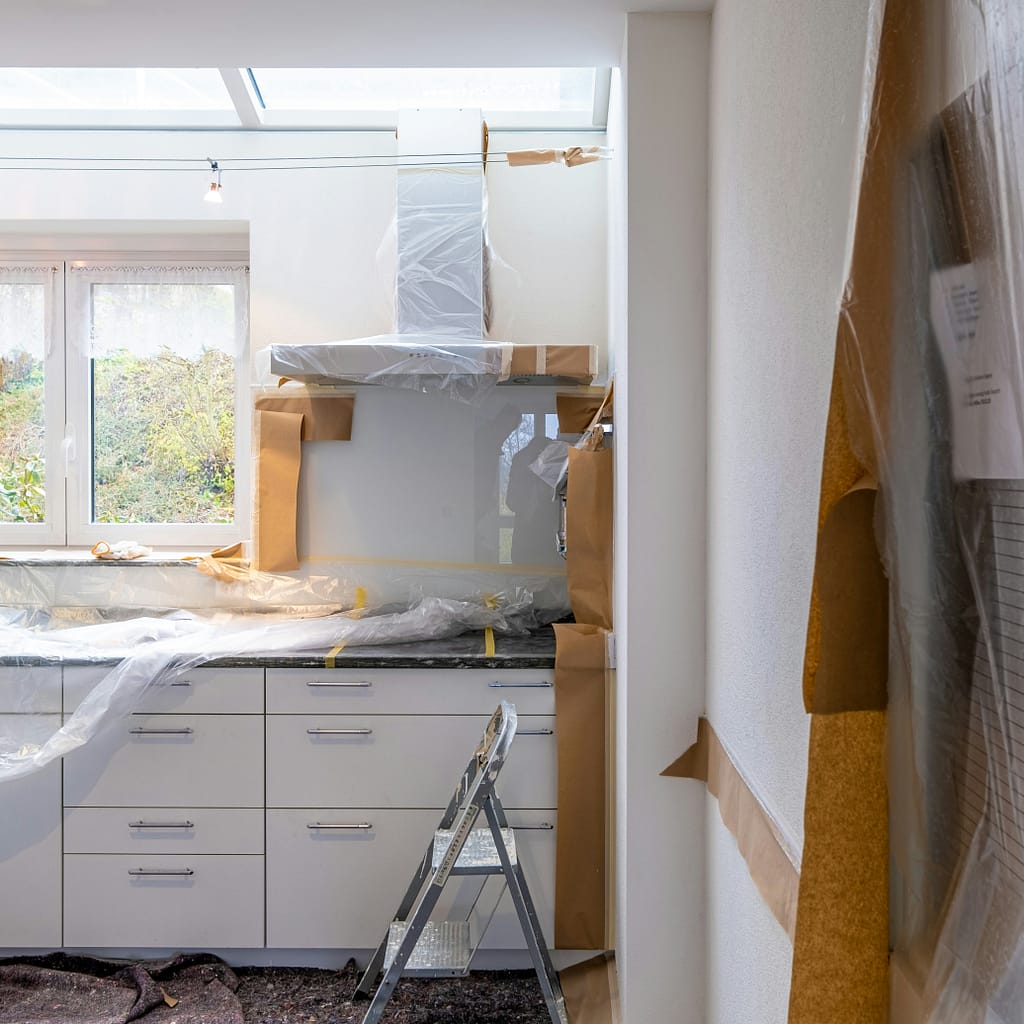Last Updated on April 9, 2025 by Tanya Janse van Rensburg
Starting a journey of remodeling a home is an exciting and rewarding experience, yet it can also be overwhelming.
Transforming your new home helps you reflect your taste and style to meet your needs.
This guide will help you easily navigate the remodeling process, whether you want to upgrade your appliances, such as a mini-split system or dishwasher, change your kitchen layout, renovate your bathroom, or overhaul your entire house.


Assessing what your new home needs and how you want your space to look is crucial before embarking on your home remodeling project.
Here are some pointers:
Take a walk-through of your home and identify areas that need change or improvement.
Look for outdated features, damaged or worn-out materials, or functional problems and list them for easier prioritization.
Establish a clear renovation goal to help you match your efforts with your goals.
Ask yourself what you want to achieve by the end of the renovation process.
Are you looking for a more visually appealing appearance, a more functional home, or an increase in your home’s value?
Prioritizing your projects can help you meet your needs, budget, and timeline.
Identify projects that require immediate attention and those that can be completed later.

Home renovations require permits depending on your geographical location to ensure you comply with local building codes and regulations.
For example, you’ll need a permit for structural, electrical, or plumbing changes to ensure the work meets standards set by the local building department.
Acquiring permits can be long and frustrating, so applying early is best.
Before remodeling your home, you’d need to know how you want to tackle the project.
Do you want to do it yourself (DIY) or want to hire experts?
Both options are worthwhile, but they have their pros and cons, making it crucial to pick one depending on:
Some projects, such as painting or replacing fixtures, can be simple, and you can choose to DIY.
On the other hand, tasks such as electricity may need specialized knowledge, hence the need for a professional.
Some projects may require more effort and time. If you have limited time, consider hiring professionals to save time.


You’ll need a realistic budget before tearing walls down or throwing away that old carpet.
Remodeling a home can be expensive, so it's good to have a budget to estimate your spending.
If you choose the professional way, the home remodeling contractors can help create a budget.
Otherwise, for DIY, you can consider these points:
Conduct thorough research on pricing for the improvements you plan to make.
Ask for quotes from different suppliers to get a fair price.
With various quotes, you’ll know what you can expect to spend.
Some unexpected expenses, such as water pipe damage, will arise during home remodeling when you least expect it.
Ensure you wiggle room in your budget for such surprises.
The good thing about home remodeling is that many financing options are available.
You can research home improvement loans, mortgage refinancing, and home equity lines of credit (HELOC).
Some benefits of financing options include preserving savings and flexible repayment options.

Setting your home remodeling timeline helps determine when specific tasks will be completed.
It's like having a roadmap of the entire project outlining all the phases and the time they'll take to complete.
This could include demolition, ordering materials, hiring contractors, and completing different stages of the remodel.
It's essential to consider and plan for potential delays that may arise during your remodeling project, such as delays in obtaining permits or structural issues.

If you’re not a handyperson or want a professional to handle your home remodeling project, you'll need to hire a contractor.
A professional remodeling contractor will save you time and provide quality workmanship, ultimately saving you money.
Utmost care is crucial when hiring contractors. Take time to examine their credentials, experience, and testimonials.
You can ask your friends or family for recommendations or check local home remodeling associations for certified contractors.
Once you have narrowed down your top contractors, request their estimates so you can negotiate and choose the best offer.
Ensure you clearly state the scope of work, the materials you prefer, the timeline, and payment terms.
It’s not wise to base your option on price alone—a lower bid may indicate lower quality work or potential hidden costs later on.
Clear communication is vital to remodeling your home.
Let your contractor understand your expectations and listen actively to their suggestions.
Good coordination with your contractors ensures your project stays on track.

You can add value to your property while enhancing your living space.
To maximize your return on investment (ROI) of your home, consider:
These upgrades can enhance your home’s comfort and functionality and attract potential buyers if you decide to sell.
Examples of sustainable and smart home upgrades include using eco-friendly building materials and integrating smart home technology such as intelligent lighting and smart cameras.
You can also install renewable energy and energy-efficient appliances such as heating and cooling systems.
While it's tempting to go out of your way to make your home stand out from the others, it's good to stay within the standards of the neighboring properties.
Over-improvement may lead to going beyond market expectations, even in the future.

Here are some tips for remodeling different rooms in your home:
When renovating your kitchen, consider:
For bathroom improvement, consider:
Your living space is one of the most essential rooms in your home because it's a place to entertain and socialize with your friends and family.
To transform it, consider:
The backyard is an extension of your home, and you can consider the following to make your outdoor space luxurious:

Remodeling a home is a big undertaking that needs careful planning, from assessing areas that need attention, getting permits, and creating budgets to hiring and managing contractors.
Thorough research is essential whether you’re renovating your living room, kitchen, bathroom, bedroom, or backyard space or need a complete home overhaul.
With careful planning and the right approach, you can quickly transform your house into the haven of your dreams.